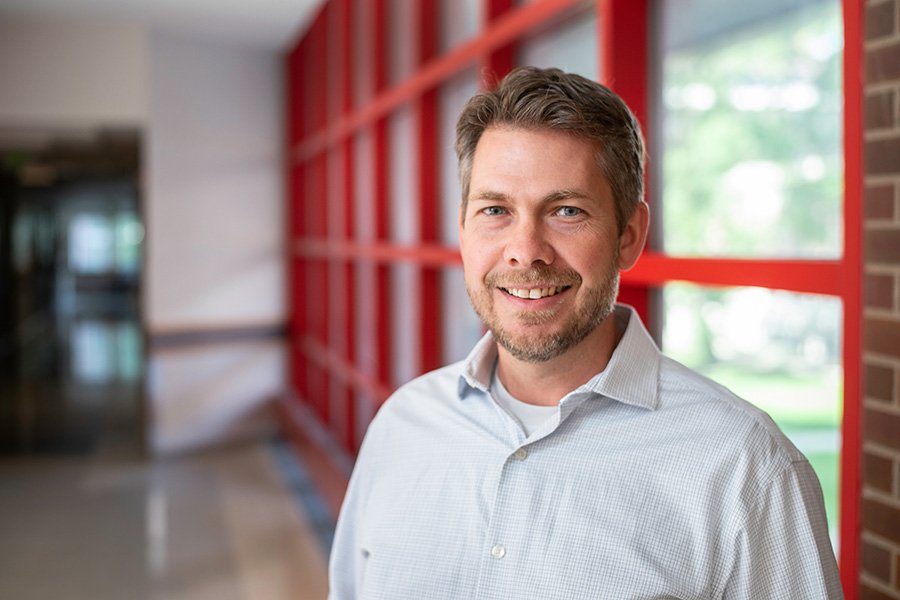Chad Myers Earns Award for Outstanding Contributions to Graduate and Professional Education

Department of Computer Science & Engineering Professor Chad Myers has earned the 2023-24 Award for Outstanding Contributions to Graduate and Professional Education. Those who receive the award become members of the Academy of Distinguished Teachers (ADT) and earn the title of Distinguished University Teacher. Additionally, honorees receive a $15,000 award and have their name engraved on the Scholars Walk on campus. Myers is the co-Director of Graduate Studies (DGS) for the Bioinformatics and Computational Biology (BICB) program and has mentored over 20 Ph.D. students.
“There are a large number of faculty at the University of Minnesota that contribute to graduate and professional education and spend a lot of energy doing that at a high level,” said Myers. “To be recognized in that group is a huge honor.”
Myers joined the University of Minnesota in 2008, the same year the BICB program was created by founding faculty members Claudia Newhouser, Vipin Kumar, John Carlis, and some key people at the Mayo Clinic and Hormel. After supporting the program for eight years as a graduate faculty member, Myers transitioned into the co-DGS role in 2017 with Yuk Sham from the Department of Integrative Biology and Physiology.
“Yuk (Sham) has been a very stable presence for the program and teaches a number of courses,” said Myers. “He’s a really important part of its success. Also, the support from the Department of Computer Science & Engineering has also been huge. Mats (Heimdahl) and Vipin (Kumar) recognized the importance of the program. And of course the program’s founders have played a huge role in the success of the program.”
BICB is a cross-collegiate and cross-institution graduate program that consists of over 150 graduate faculty and currently serves approximately 180 graduate students. Students and faculty associated with this program are distributed across several different partner sites including UMN Twin Cities, UMN-Rochester, the Mayo Clinic, Hormel Institute, IBM, the National Marrow Donor Program, and the Brain Sciences Center.
“In the computational biology space, there is a huge need for teachers,” said Myers. “At the University of Minnesota, there’s an amazing medical school and a variety of biology disciplines from plant science to genetics. There is a demand for people in that line of work to have computational skills for their research. Through BICB, I have taught several hundred students and given them their first exposure to using computers to solve a problem. That’s a very rewarding step to see students take.”
Under Myers’ guidance, the BICB program has seen steady growth and increased its infrastructure to ensure the program’s longevity. In 2021, the program gained a full-time graduate program coordinator to assist with student needs. Myers hopes to formalize the program’s operations to allow for the DUG to rotate every 2-3 years. He also hopes to continue mentoring new students and younger faculty members coming up in this fast-growing field.
“Computing as a basis for biomedical science is not going away; it is only going to grow in its role,” said Myers. “All of these fields can benefit from the developments in machine learning and artificial intelligence (AI). Programs like the BICB program have students with research questions spanning a wide range of biological studies. They get to learn from each other in a unique way. I’m excited to see what kind of impact that will have at the University of Minnesota and research beyond the university setting. I’m excited to continue to teach at this intersection and mentor younger faculty as this field grows.”
This Award for Outstanding Contributions to Graduate and Professional Education is awarded annually to exceptional candidates nominated by their colleges in their quest to identify excellence in graduate and/or professional education. In addition to honoring individual faculty members, the award contributes to the improvement of graduate and professional education at the University by publicizing their work to serve as resources to the whole faculty. Learn more about the award on the Scholars Walk website.